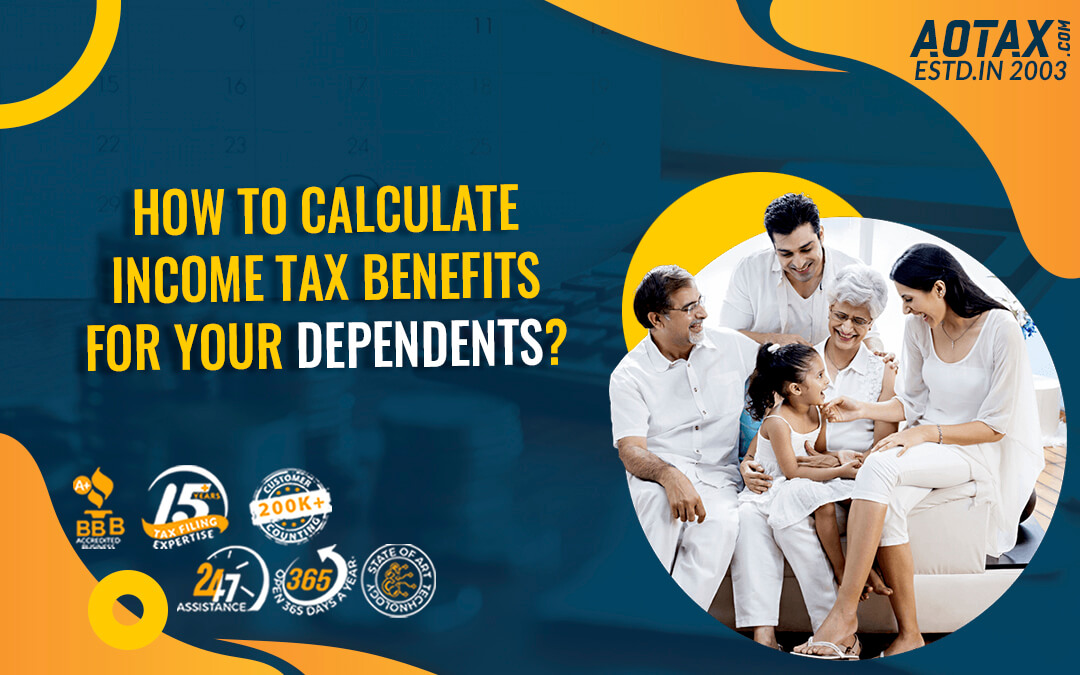
How to calculate Income Tax Benefits for your dependents?
Supporting dependents i.e. kids or even other dependents both can have an impact on your finances. However, having dependents can help you in availing certain tax advantages which can help increase your tax refunds.
We can list down some of the major things which you must know about tax benefits if you have dependents.
-
Related and unrelated dependents
You would be spending thousands of money on food, house, and education of your kids, taking care of other dependents, etc. The IRS helps you with provisions for tax breaks for your both related and unrelated dependents. These tax credits and deductions can help you in saving a considerable amount of money from a tax perspective.
-
Several tax credits and deductions for your kids
There is no doubt about the fact that raising your kids would be expensive but you must know about the tax credits and deductions which you can avail yourself if you have kids. You would qualify for availing credits such as Child Tax Credit, Child, and Dependent Care Credit, Earned Income Tax Credit, and other Education Credits as well.
-
Social Security Numbers
If you have become a new parent, then you must ensure that you have applied for the Social Security Number of your newborn baby. When you have this Social Security Number you would be able to claim the tax credits and deductions easily. Moreover, if you have any other dependent family member or relative then they must have their Social Security Number for being able to avail the tax credits.
-
Tax Credits and deductions for relatives and non-relatives
Tax credits and deductions can be extended for relatives such as your parents, your grandparents, your grandchildren, or any other blood relatives who do not need to stay with you. However, if you are availing any tax credit or deductions for your non-relatives such as boyfriend/girlfriend then they must have stayed with you for the whole year.
Now, let us have a look at some of the major tax credits which are related to your kids and other dependents.
-
Child Tax Credit
The Child Tax Credit would help reduce your tax liability dollar-for-dollar. Earlier in the year 2017, the Child Tax Credit available, if you had a dependent child below the age of 17 years, was $1000. However, with Tax reform, this Child Tax Credit has now increased to $2000 for a dependent child who is below the age of 17 years. If you are filing your tax return as a Single, then the income threshold at which you would be able to avail of the Child Tax Credit is $200,000 whereas it is $400,000 if you are married and filing jointly.
-
Child and Dependent Care Credit
You would be eligible to claim Child and Dependent Care Credit if your dependent child is below the age of 13 years and you are working or looking for work. There is no age limit for the dependent child if he is disabled. This credit would usually range from 20% to 35% of the childcare expenses that have been incurred based on your level of income. Expenses incurred in Nursery and Kindergarten schools, daycare, after-school programs would qualify for this credit.
-
Other Dependent Credit
In case you are supporting a relative or your dependent kid is above the age of 17 years, you can still be able to claim tax credits. This credit is the Other Dependent Credit which is up to $500for each qualifying individual. However, this credit would phase out if you are filing taxes as a Single with an AGI greater than $200,000 or if you are married and filing taxes jointly with an AGI more than $400,000.
-
Earned Income Tax Credit (EITC)
The Earned Income Tax Credit is mainly useful for those Americans who are self-employed and have income below a certain level. The amount you can receive as a credit in Earned Income Tax Credit would mainly be based on your filing status, your level of income, the number of qualifying kids you have, etc. The EITC is refundable and in case your credit is more than your tax liability you can easily obtain a refund. For the year 2020, you can receive EITC ranging from a maximum value of $6660 if you have three or more than that qualifying children to $538 in case if you have no children.
Conclusion
Hence, your children and other dependents can help you in obtaining these tax credits and thus pay lower federal income taxes.

Recent Comments